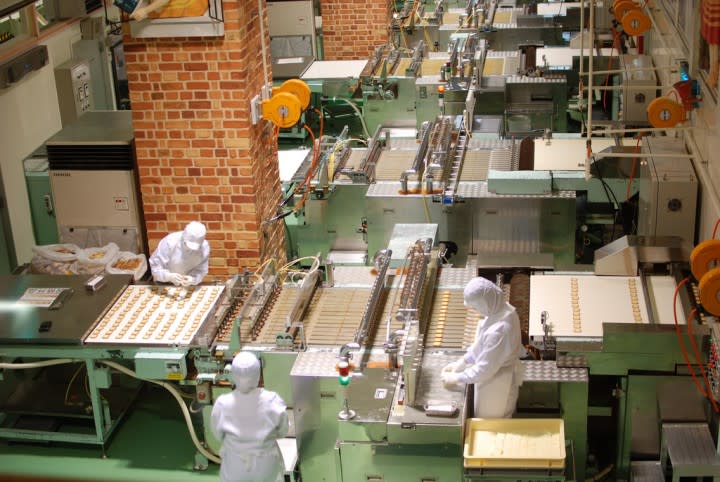Arcstone is Google Analytics for manufacturing, and it could change how factories are run

“Competition is for losers,” declared PayPal founder Peter Thiel in a Stanford lecture about startups. He elaborated on the theme in his book Zero to One, positing that startups should aim to monopolize a niche market first before expanding outwards.
Arcstone is following that prescription to a T. The Singapore-based startup is building a truly modular and customizable analytics platform for manufacturers. Think of it as a Google Analytics or Mixpanel for factories – but instead of tracking website visitors, Arcstone gives users an overview of what is happening on the production floor.
The company was founded by Willson Deng, an American software engineer who graduated with an industrial engineering degree from UC Berkeley and a master’s from INSEAD business school. Manufacturing bores most people, but he geeks out over it. He worked with Boeing in their manufacturing plant, and had stints at everything from smart meters to wineries to gourmet chocolates, all on the manufacturing side. He also worked as an engineer at Bioproduction, a startup that did production simulations for pharmaceutical companies.
“I’ve always found it fascinating: the idea of being able to walk into a factory and see everything in motion and see things moving along. It’s always been a fascination to me ever since I was young. If you watch How It’s Made on Discovery Channel, it’s been an inspiration for many of the production guys out there.”
Here’s a video of the show, zooming in on how drill bits are made. It actually has over 700,000 views, not bad considering it’s not a cat video:
The fact that many more people care about eating sausages than how they’re made is an advantage to Deng. His combination of domain expertise in manufacturing and engineering lets him spot opportunities others miss. Better, it allows him to act on the idea. Manufacturers won’t even listen to your pitch if you don’t have experience in production. That raises the barrier to entry for Arcstone’s competitors. Indeed, when Deng asked if I know of any other tech startup in the manufacturing space in Singapore, I drew a blank.
Building smart factories
Arcstone hasn’t raised any funding from investors, and it probably doesn’t need to do so to be a sustainable business (nonetheless it is raising a seed round to fund product development and sales). It has already secured six paying clients and generated six figures in revenue since it started in April 2013. Some customers include robotics and automation tech firm ABB, as well as Phoon Huat, a Singapore-based manufacturer of baking ingredients.
But what makes Arcstone special? While mom-and-pop stores have simple processes when making their goods, blind spots increase as they get bigger and production lines rise in complexity. Arcstone lowers the cost of monitoring manufacturing plants and increases the speed at which users can deal with changing situations.
For instance, it tells manufacturers which production line to fit in a rushed order, and where to pull people from to work on an urgent task. It alerts workers which line to move to without needing supervisors to shout orders, and the manufacturer’s clients check at which stage the production process is at. It automates scheduling of workers, notifies the maintenance crew when a machine breaks down, and sounds the alarms to supervisors just as things are getting delayed.
For many manufacturers today, error handling is often retroactive and resembles a firefighting situation. “You don’t hear about the news until the end of the day when people are clocking out and then they tell you something has gone wrong. And by then a lot of time has been wasted,” says Deng.
Arcstone isn’t the first company to focus on optimizing manufacturing processes, but Deng believes it has an edge. Some companies focus solely on optimization and analytics. This means they can’t prevent what’s called a “garbage-in, garbage-out” situation in which flawed data renders any analysis impossible.
The startup solves this by providing an end-to-end service: it takes care of data collection in addition to parsing the data. It hooks up to production floor machines to gather information from them, and combines that with data from kiosks (simple tablets) – keyed in manually by workers. The data involves manual processes that aren’t captured through any other means.
According to Deng, another problem with competing software is that they’re not built from the ground up to be flexible, because most features are hard-coded. That means the software needs to be reconfigured each time by a coder and analyst for every new client. That adds up to hefty consulting fees not just when a client acquires a new system, but over time whenever its requirements change because the system needs to be reconfigured again and again.
“[Our software] is modular in a way […] we don’t have to recode things. When we go from industry to industry we just flip those switches in the backend. Again, no code needs to apply, but an analyst we send out will just configure that and deploy it right away,” says Deng. That means customers can pick the features they need – perhaps they just want the data monitoring component – and just pay for those.
Productivity at any cost

Arcstone brings the internet of things to factories.
Arcstone is in a good position right now, having made revenue with a small team of seven despite not securing any seed funding. But when it does raise money, it plans to invest the cash to develop ways to integrate its systems closer with machinery. That means going to original equipment manufacturers (OEMs) that build the production facilities and integrate directly with the machines, instead of going to factories and figuring out retroactively how the processes work and how to integrate the software.
Working with OEMs also allows Arcstone to create a better way for machines to communicate with its system. Right now, different machines spit out data in different formats, some in a user-friendlier way than others. So instead of having to clean the data each time they’re collected, Arcstone and the OEMs can make sure the data comes out being machine-readable.
Given that Deng is an American, it’s refreshing though not surprising that he has chosen to focus on the Singapore and Southeast Asian markets for expansion. According to him, manufacturing plants in Asia are relatively less efficient compared to their European or American counterparts, and therefore in greater need for improvement. Besides, while China may be the world’s manufacturing hub, rising labor costs there has meant that a lot of facilities are shifting to Southeast Asia.
While Singapore is not known for low wages, it could be a lucrative market, given that it is a high-end manufacturing center. There’s now also a state-mandated push toward greater productivity and less reliance on cheap labor across all industries. The state is even giving money to companies to upgrade their systems in the name of productivity, and that’s an opportunity for the startup.
Arcstone is essentially enabling smaller manufacturers to invest in optimization systems by lowering costs. Its clients range from small and medium enterprises to multinational corporations. It also caters to firms that want to take advantage of globalization to win contracts outside local markets.
“If you look at one of the biggest reasons why the manufacturing plants around Southeast Asia, especially local ones that are being started, can’t get outside the local level is that there isn’t enough quality control and management on the products such that they can expand to the US and Europe where there are more stringent quality concerns,” says Deng.
“Yeah, it may be that labor is cheap, but if you don’t have a system like ours that is able to monitor, track, and provide the quality reference that’s needed, you can’t sell to the other markets. Even if you have low costs, you’re not solving everything.”
This post Arcstone is Google Analytics for manufacturing, and it could change how factories are run appeared first on Tech in Asia.

 Yahoo Finance
Yahoo Finance 
